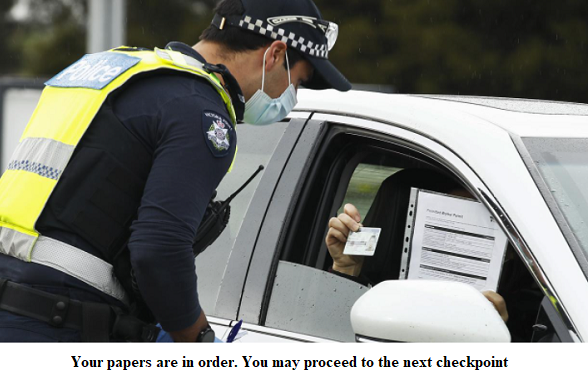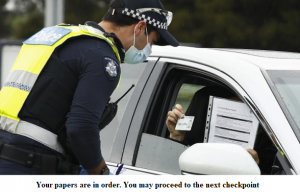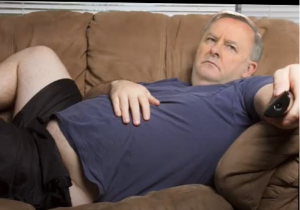Emergency Powers and the Rule of Law

There is one ambition at least which I ever will acknowledge, which I will not renounce but with my life – it is the ambition of delivering to my posterity those rights of freedom which I have received from my ancestors. I am not pleading the cause of an individual, but of every freeholder in England… Unlimited power is apt to corrupt the minds of those who possess it; and this I know, my Lords, that where the law ends, there tyranny begins.
— William Pitt addressing the House of Lords, January 9, 1770 [1]
Since March 2020 Australia’s governments have been using their powers to excessively coerce, obstruct or otherwise unreasonably interfere with the life, liberty and property of the citizen. These governments are exercising emergency powers to impose measures that profoundly undermine basic principles of the rule of law, including equality before the law and the right of citizens to be protected from unpredictable and arbitrary interference with their vital interests. On the pretence of fighting a virus, draconian measures have been adopted that profoundly violate the Australian Constitution and the inalienable rights of the individual.
When laws are created to regulate coercion and violence, the government can never undermine the inalienable rights of the individual. That being so, writes Trevor Allan, a constitutional law professor at Cambridge University, the concept of the rule of law encompasses “traditional ideas about individual liberty and natural justice and, more generally, ideas about the requirements of justice and fairness in the relations between governors and governed”.[2] Indeed, an important element of the rule of law is that laws must limit, control and guide the exercise of discretionary power. As Professor Allan points out,
It would be foolish to ignore or deny the real threat to liberty that such discretionary powers present; they leave the citizen at the mercy of the judgement of public officials, who may have little incentive to allow even reasonable objections to thwart their pursuit of their own policy agendas. There is a danger of oppression or unfairness, even when officials are well intentioned and act in good faith in (what they deem) the public interest”.[3]
The realisation of the rule of law depends, however, “as much on characteristics of society as of the law, and on their interactions”.[4] This ideal of legality is not just a matter of “detailed institutional design” but, primarily, an “interconnected cluster of values” that can be pursued in a variety of legal-institutional ways.[5] Indeed, the fact it has often “thrived best where it was least designed”[6] appears to indicate that the realisation of the rule of law is not just about legal-institutional design but also social-cultural outcomes.[7]
In this sense, it is imperative to understand that law is not always the primary element of political legitimisation.[8] Sometimes there are other and more culturally acceptable ways to legitimise power rather than through law. On the basis of charismatic leadership, for example, power is not primarily legitimised by legal means but instead via the devotion to the generally perceived “exceptional sanctity, heroism, or exemplary character of an individual person, and of the normative patterns or order revealed or ordained by him”.[9] This state of affairs results in the phenomenon of ‘charismatic leadership’ being more socially accepted as a more valid form of legitimisation of power than constitutionalism. As Sir Ivor Jennings KBE QC FBA, a British lawyer and legal academic who served as the Vice-Chancellor of the University of Cambridge, properly observed:
If it is believed that the individual finds his greatest happiness, or best develops his soul, in a strong and powerful State, and that government implies… the unity of the [community] behind a wise and beneficent leader, the rule of law is a pernicious doctrine.[10]
Accordingly, what gives real life to the ideal of the rule of law lies in the social environment, which, according to Sir Lawrence Friedman, “is constantly at work on the law – destroying here, renewing there; invigorating here, deadening there; choosing what parts of law will operate, which parts will not; what substitutes, detours, and bypasses will spring up; what changes will take place”.[11] We may therefore, conclude that the rule of law simply cannot operate more effectively when “political leaders do not fear citizen mobilization when fundamental rules of the game are violated”.[12] As the American political scientist and emeritus professor, Noel B. Reynolds, asserted:
The rule of law does poorly in cultures where it is not the fundamental expectation that a people has of its government… If people do not expect the rule of law and insist on it when officials move to compromise its effect, it is soon corrupted and replaced by rule of will. Rule of law seems to require this virtue of any populace that will enjoy its benefits.[13]
The deep unease and fear that saturate Australian society have created a population disposed to governments whose insatiable thirst for power and control leads to authoritarian measures. Significantly, the political establishment has not acted alone, relying largely on so-called “chief health advisers” who then become the de facto rulers over the people as the establishment’s effective enablers.
Providing discretionary directions, these health advisers are perfectly positioned to act as the mastermind behind most of the government’s extra-constitutional schemes. Part of such a master plan, of course, involves dismantling the rule of law. To avoid the growing concern of human rights violations and outright suppression of the constitutional order, the political establishment has learned about the importance of manipulating public perceptions in order to win support of what normally would be rejected as oppressive and undemocratic measures.
Paradoxically, the nation’s political establishment has managed to undermine the rule of law through supposedly legal means. The success at sustaining legitimacy to arbitrary rule and maintaining a façade of legality arises out of a narrow positivistic justification used to shroud otherwise unconstitutional exercises of power that violate the most basic principles of the rule of law and fundamental human rights.
While these political rulers claim to be “saving” lives, they have set in motion the gradual accumulation of power in the hands of a few, thus solidifying their extensive power primarily through the creation of legal loopholes that hide the invalidity of unconstitutional measures through a legalistic veneer. To begin, the institution of emergency powers which authorise governments to rule by executive decree include measures that engender an unfair system and which do not guarantee the equality of all citizens before the law, and the appropriate checks to executive authority.
Central to the concept of the rule of law is the conviction that a separation of powers comprise “a critical aspect of every system of government which hopes to combine efficiency and the greatest possible exercise of personal freedom”.[14] The idea rests on the view that when power becomes far too concentrated in the hands of a few, then the risk of oppression naturally increases. This conception of the separation of powers reflects the classical tripartite model outlined by Montesquieu, Locke (most notably in the Second Treatise of Civil Government) and Madison (most notably in The Federalist Papers). The importance of this separation is explained by Montesquieu in the following terms:
Freedom is to be found only where there is no abuse of power. But constant experience shows us that every man invested with power is apt to abuse it, and to carry his authority as far as it will go. Is it not strange, though true, to say that even virtue itself has need of limits? To prevent this abuse, it is necessary from the very nature of things that power should be a check to power…
When the legislative and executive powers are united in the same person, or in the same body of magistrates, there can be no liberty; because apprehensions may arise, lest the same political ruler or senate should enact tyrannical laws, to execute them in a tyrannical manner.
Again, there is no freedom, if the judiciary power be not separated from the legislative and executive. Were it joined with the legislative, the life and liberty of the subject would be exposed to arbitrary control; for the judge would be then the legislator. Were it joined to the executive power, the judge might behave with violence and oppression.[15]
Observations of Australia’s slide down the slippery slope to despotism regardless of the appearance of legality lends support to traditional considerations about the realisation of the rule of law, which include substantive considerations based on the doctrine of separation of powers. In this sense, an underlying theme in constitutionalism is that the rule of law provides at least part of the solution to the problem of despotic government.[16] In his classic text, The Spirit of Laws, Montesquieu crystallised the more relevant aspects of despotism: “In despotic government, one alone … draws everything along by his will and his caprices”.[17] And later: “the principle of despotic government [is]… fear”.[18]
One way that despotic government is manifesting itself in Australia is through the expending volume of legislative discretions given to the executive, which, in the words of emeritus law professor Suri Ratnapala, is “a bit like entrusting the sheep to the wolf”.[19] According to him, “[t]he rule against the delegation of wide law making power to the executive is a major component of the classical doctrine of separation of powers. When officials can both legislate and execute their legislation they have the potential to place themselves above the law, for the ‘law’ is what they command”.[20]
This dilution of executive and legislative separation is now having a number of disastrous implications, each of which Ratnapala views as being key flaws in the Australian constitutional scheme. To make it worse, he observes that, “[i]n Australia, the High Court, despite having full judicial power has declined to impose on Parliament any significant constraint on its competence to delegate its legislative power to the executive”.[21] Pointing to decisions such as Victorian Stevedoring and General Contracting Co Pty Ltd v Dignan (1931), he laments that the Court has chosen to not “draw the line in the sand against excessive delegation”, despite functional “parliamentary democracies rely[ing] heavily on judicial oversight of executive action”.[22]
Without the protection of civil liberties, a country cannot call itself a true democracy. To avoid the growing concern of outright suppression of basic human rights, the Australian political establishment has learned about the necessity of manipulating public perceptions to win support of what normally would be rejected as unconstitutional measures. In essence, government propaganda, which is disseminated by the mainstream media, has been deeply successful in justifying these measures, thus making the media an effective means of censoring anti-establishment messages. Without an alternative view, of course, the public tend to view reports of human rights violations merely as “excesses” or “collateral damage” – the price to fight a “deadly virus”.
Above all, the experience of contemporary Australia vividly exemplifies a disguised form of authoritarianism under the façade of temporary measures to combat an alleged health crisis. Rather than openly violating the constitutional order, governmental accountability is dangerously weakened by insulating the political ruler from scrutiny and a functioning system of checks and balances.
Why does the public permit this unabashed expansion of governmental power? Fear of death has become ingrained in the psyche of the Australian population. Importantly, the arbitrary use of power depends on maintaining public support through a clearly calculated media campaign that sustains an irrational level of public fear and anxiety. In consultation with carefully chosen, so-called health advisers, politicians can manipulate a significant sector of the media which then sensationalise coronavirus cases and manipulate the masses. The carefully carried psychological campaign aims ultimately at instilling great fear in the general public.
This recipe for despotic rule has re-ordered political and social manners in Australia, thus creating a culture of fear that perpetuates the willingness of citizens to surrender their fundamental rights in exchange for a false sense of security. As such, the average citizen becomes prone to cede their basic rights for a paternalistic government in exchange for more safety and protection.
The legal-institutional structures which have well served to protect the citizen from external oppression – the sine qua non of democratic government – tend to disappear in the process. Without constitutional guarantees of the basic rights to freely associate, to freedom of speech, and to the inviolability of the person’s bodily autonomy, democratic society shrivels under the threat of authoritarianism and lawful resistance against political oppression, the status quo actively contributing decisively to the undermining of the rule of law and inalienable rights of the individual.
Despite the alleged success in the “war” against a supposedly deadly virus, governments in Australia do not seem willing to terminate their emergency powers or decrease the use of health directives, hence the ongoing justification for the continuing use of such powers. Instead, the political establishment has capitalised on public fear and anxiety as a successful means of assuring the gradual consolidation of unchecked rule.
This institutionalisation of fear allows the political establishment to control and immobilise civil society. In this context, the label “anti-vax” becomes an efficient means of silencing any opposition to the narrative of the status quo, thus undermining one of the primary pillars of democracy: freedom of speech. The anti-vax slur operates via a form of “contagion theory” whereby calling anyone a “conspiracy theorist”, or implying that they oppose all forms vaccination, are Machiavellian attempts to silence rational debate and democratic dialogue.
In theory, the use of emergency powers by the ruling elites should be a temporary departure from constitutional rule, in which a political leader might need to rule by decree until the emergency ceases to exist. The Australian political establishment, however, may never intend these measures to be actually temporary, thus seeking to conveniently maintain its extraordinary powers indefinitely. That being so, convincing the population of a perpetual state of emergency gives the ruling elite broad discretionary authority to govern at the margin of the democratic process, unconstrained by legal-institutional accountability.
Ultimately, the success of any authoritarian endeavour requires popular acquiescence. Convincing the population of a grave health emergency leads to less popular resistance and more political space in which to expand its arbitrary powers. If the political establishment can convince the people that a great public emergency exists, it faces less resistance to continue expanding its governmental power.
In this sense, the coronavirus phenomenon shows how easily the rule of law breaks down when an alleged threat taps into the population’s deepest fears. Surely, a government always reserves the right to enact emergency powers in order to protect the health of the people. Even international law recognises that during these extraordinary times, governments may suspend normal constitutional protections, with the exception of inalienable rights. When the political leader violates these inalienable rights, then he or she must be held accountable for transgressing the substantive norms associated with the rule of law. In these ways the political leader is automatically susceptible to the commitment of human rights violations that may eventually lead to charges of crimes against humanity.
In reality, the Universal Declaration of Human Rights openly recognises, in its preamble, the critical role of the rule of law in preserving the inalienable rights of the individual, by stating:
Whereas it is essential, if man is not to be compelled to have recourse, as a last resort, to rebellion against tyranny and oppression, that human rights should be protected by the rule of law.
Thus, in the context of international human rights legislation, it is unquestionable that the nation’s political establishment has violated an international definition of the rule of law which includes the lawful right of citizens to resist unconstitutional instances of arbitrary government.
The lawful right to resist arbitrary government is certainly guaranteed by the International Covenant for Civil and Political Rights (ICCPR). Under its Article 19, “everyone shall have the right to freedom of expression”. And as stated by Article 18 of the ICCPR, “everyone shall have the right to freedom of thought, conscience and religion”.
As noted by emeritus professor Gabriël A. Moens AM, one of the nation’s leading constitutional law experts, civil disobedience can be perfectly justified “when the normal channels of social change do not function properly anymore or whenever serious grievances are not heard … a system does not function adequately anymore when some groups have entrenched power positions in society and use their power to impose their will on weaker or vulnerable classes of people.”[23]
We can only hope Australians will no longer tolerate any further abdication of their fundamental rights, as they finally wake up to the disguised efforts of the political establishment to ensconce itself in power. When this happens, of course, the extraordinary accumulation of unrestrained power by the ruling classes will no longer be justifiable as a legitimate measure, thus revealing a deliberate attempt to eliminate the rule of law via the expansion (and concentration) of such a power in the hands of an entrenched oligarchy.
Augusto Zimmermann LLB, LLM, PhD, CIArb, DipEd, is Professor and Head of Law at Sheridan Institute of Higher Education in Perth, WA. From 2012 to 2017, he served as a Law Reform Commissioner in Western Australia. While teaching constitutional law at Murdoch University, Professor Zimmermann was awarded the 2012 Vice Chancellor’s Award for Excellence in Research, as well as two Law School Dean’s Research Awards, in 2010 and 2011. He is the author of numerous academic articles on the Rule of Law, contributing, inter alia, for a seminal book on the subject edited by the President of the American Bar Association: The Legal Doctrines of the Rule of Law and the Legal State (Rechtsstaat), Springer, 2014. Professor Zimmermann is also the co-editor of Fundamental Rights in the Age of Covid-19, Connor Court Publishing, 2021.
[1] Quoted from: Brian MacArthur (ed.), The Penguin Book of Historic Speeches (London: Penguin), 114.
[2] T.R.S. Allan, Law, Liberty, and Justice: The Legal Foundations of British Constitutionalism (Oxford: Clarendon Press, 1993), 21.
[3] T.R.S. Allan, ‘Freedom, Equality, Legality’, in James R. Silkenat et al (eds.), The Legal Doctrines of the Rule of Law and the Legal State (Rechtsstaat) (Springer, 2014), 160.
[4] Martin Krygier, False Dichotomies, True Perplexities, and the Rule of Law. Paper presented at the Center for the Study of Law and Society (University of California, Berkeley, 2003), 11.
[5] Martin Krygier, ‘Rule of Law’ in N.J. Smelse and P.B. Baltes (eds.), International Enclylopedia of the Social & Behavioral Sciences (2001), 13404.
[6] Martin Krygier, ‘Compared to What? Thoughts on Law and Justice’, Quadrant Magazine, December 1993.
[7] Martin Krygier, ‘The Rule of Law: An Abuser’s Guide’. Paper presented at the 13th annual conference on ‘The Individual vs The State’, Central European University, Budapest, Hungary, 10-11 June 2004, 23.
[8] Brian Z. Tamanaha, A General Jurisprudence of Law and Society (Oxford University Press, 2001), 140.
[9] Max Weber, Theory of Social and Economic Organization (New York: Praeger, 1983), 215.
[10] Sir Ivor Jennings, The Law and the Constitution (London: University of London Press, 1959), 46.
[11] Lawrence M. Friedman, The Legal System: A Social Science Perspective (New York/NY: Russell Sage, 1975), 193-94.
[12] Miguel Schor, ‘Constitutionalism Through the Looking Glass of Latin America’ (2006) 41 Texas International Law Journal 1, 7.
[13] Ibid.
[14] M.C.J. Vile, Constitutionalism and the Separation of Powers (2nd ed., Indianapolis/IN: Liberty Fund, 1998), 261
[15] Baron de Montesquieu, The Spirit of the Laws (1748), Bk .11, Chap. VI.
[16] Suri Ratnapala, Welfare State or Constitutional State? (Sydney/NSW: The Centre for Independent Studies, 1990), 19.
[17] Montesquieu, Bk. 2, Chap I.
[18] Ibid, Bk.3, Chap. 9.
[19] Suri Ratnapala, ‘Sri Lanka at the Constitutional Crossroads: Gaullist Presidentialism, Westminster Democracy or Tripartite Separation of Powers’ [2003/2004] LAWSIA Journal 33, 54. See also: Augusto Zimmermann & Lorraine Finlay, ‘Suri Ratnapala’s Contribution to the Understanding of the Rule of Law’ (2014) 33 (2) University of Queensland Law Journal 367, 368-72.
[20] Ratnapala, 49.
[21] Ibid.
[22] Ibid.
[23] Gabriël A. Moens AM, Enduring Ideas: Contributions to Australian Debates (Connor Court Publishing, 2020), 29.
Source: https://quadrant.org.au/opinion/liberty/2021/09/emergency-powers-and-the-rule-of-law/







